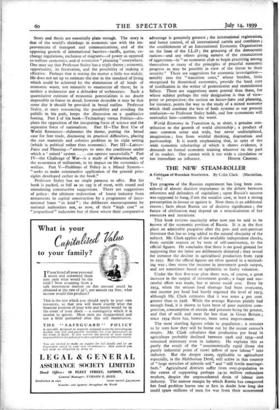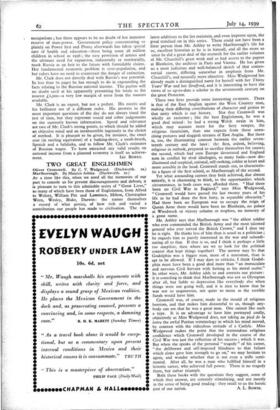THE NEW STEAM-ROLLER
THE progress of the Russian experiment has long been con- sidered of almost decisive importance in the debate between reformers and defenders of capitalism ; upon Russia's success was supposed to hang, if not the socialist case, at least a strong presumption in favour or against it. Now there is an additional reason ; facts about Russia are of decisive significance ; the future of civilisation may depend on a miscalculation of her resources and intentions.
This book reviews succinctly what now can be said to be known of the economic position of Russia. It is in the first place an admirable purgative after the pro- and anti-partisan literature that has so long added to the natural obscurity of the subject. Mr. Clark applies all the available independent checks, from outside sources or by tests of self-consistency, to the official figures. He concludes that there is no good ground for supposing that the latter are deliberately distorted ; they reveal for instance the decline in agricultural production from 1929 to 1932. But the official figures are often quoted in a mislead- ing way ; they stress the increase in investment goods output, and are sometimes based on optimistic or faulty valuation.
Under the first five-year plan there was, of course, a great increase in the output of investment goods ; a huge and suc- cessful effort was made, but at severe social cost. Even by 1934, when the serious food shortage had been overcome, real income per head had barely regained the level of 1913, although Mr. Clark estimates that it was some 4 per cent. greater than in 1928. While the average Russian plainly had enough food, it is shown to have been of poor nutritive com- position, consumption of cereals and potatoes being far greater, and that of milk and meat far less than in Great Britain ; since 1934 there has, however, been some improvement.
The most startling figures relate to population ; it remains to be seen how they will be borne out by the recent census's results. Mr. Clark calculates that production per head in agriculture probably declined between 1928 and 1934—and remained stationary even in industry. He explains this as partly the result of the " uneconomically rapid (from the purely industrial point of view) inflow of new labour " into industry. But the deeper cause, applicable to agriculture especially, is the Malthusian Devil, still active in this country of " large stretches of infertile soil " and " still fertile marriage- beds." Agricultural districts suffer from over-population to the extent of supporting perhaps 24-30 million redundant workers, despite the unprecedented drain of labour into industry. The narrow margin by which Russia has conquered her food problem leaves one at first in doubt how long she could spare millions of men for war from their accustomed
occupations ; but there appears to be no doubt of her immense reserve of man-power. Government policy concentrating so plainly on Power first and Plenty afterwards has taken special care of health and education—there being some 28 million children in school in 1936 ; the easy provision of armies and the ultimate need for expansion, industrially or territorially, mark Russia as an heir to the future with formidable claims. Her fundamental economic problem is over-population, and her rulers have no need to counteract the danger of extinction.
Mr. Clark does not directly deal with Russia's war potential. In less than 7o pages he has enough to do in expounding the facts relating to the Russian national income. The purists will no doubt cavil at his apparently presenting his totals to the nearest £r,000—a very low margin of error from the sources available.
Mr. Clark is an expert, but not a pedant. His merits and his brilliance are of a different order. His answers to the most important questions of the day do not always stand the test of time, but they represent sound and sober judgements on the currently known information. Speed and relevance are two of Mr. Clark's strong points, to which should be added an objective mind and an inexhaustible ingenuity in the choice of method. It is pleasant to be given, for instance, the exact cost (in sterling equivalent) of a bathing-dress, a tooth-brush, lipstick and a balalaika, and to follow Mr. Clark's estimates of Russian wages. To have extracted any valid results on national income from a planned economy is itself an achieve-











































 Previous page
Previous page